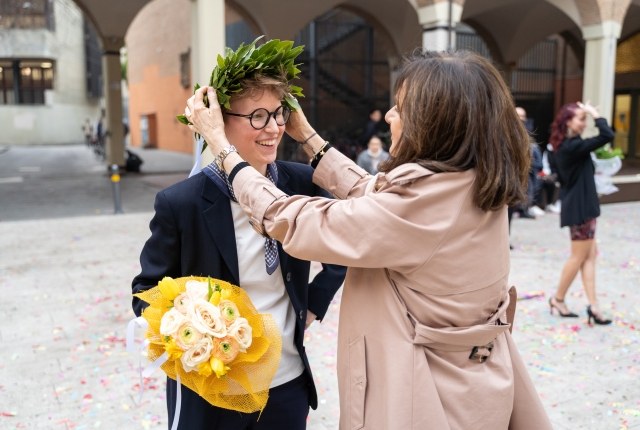An inclusive and highly attractive university offering high quality learning activities and services. This is the picture that emerges from the new Report on the Profile and Employment Status of Graduates produced by the AlmaLaurea Inter-University Consortium.
PROFILE OF UNIBO GRADUATES
In terms of the profile of graduates, the survey considered approximately 300,000 graduates from 78 universities. Of these, 19,678 were graduates of the University of Bologna: 9,738 bachelor’s degrees, 8,261 master’s degrees and 1,679 combined bachelor’s and master’s degrees.
The data confirms the strong attractiveness of the University of Bologna. In fact, 46.7% of Unibo graduates come from outside the region, almost double the national average (24.8%), and up on last year's figure (45.5%). In particular, 39.4% of bachelor’s graduates, 55.9% of master's graduates and 43.7% of combined bachelor’s and master’s graduates came from outside the region.
In addition, the number of international graduates is on the rise, 7.2% (compared to 6.9% last year): again, above the national average (which stands at 4.7%), with a particularly high number of master’s graduates (10.9% compared to the national average of 7.7%). these figures reflect a trend of steady growth: this year's enrolment of international students has increased by 11% compared to the previous academic year.
The number of students graduating within the expected timeframe is also above average at the University of Bologna: 70.6% graduate on time, compared to 61.5% nationally. In particular, 72.2% of students enrolling for a three-year bachelor’s degree programme (61.3% national average), 70.7% of students enrolling for a two-year master's degree (64.8% national average) and 60.5% of students enrolling for a combined bachelor’s and master’s degree programme (52.3% national average) graduate within the expected time.
Another strength that emerges from the data is the number of graduates who have studied abroad as part of their degree programme: 14.4% of the total (up from 12.7% last year), compared to a national average of 9.8%. these include 12.2% of bachelor’s graduates (7.3% national average), 16.7% of master's graduates (12.5% national average) and 16.2% of combined bachelor’s and master’s graduates (13.8% national average).
The number of internships recognised by degree programmes is also increasing. Among University of Bologna graduates, 61.7% completed a work placement (national average 60.7%), up from 60.1% last year: 57% for three-year bachelor’s degree graduates, 66.3% for master’s graduates and 66.2% for combined bachelor’s and master’s degree graduates.
Overall, 90% of graduates say they are satisfied with their experience at the University of Bologna. In particular, 88.1% said they were satisfied with the relationship they had with the teaching staff. In terms of the facilities provided by the University, 86.7 % of graduates felt they were adequate. 73% of graduates would choose the same degree programme and the same university again, while 14.4% would re-enrol at the same university, but in a different degree programme.
THE EMPLOYMENT STATUS OF UNIBO GRADUATES
The new AlmaLaurea Report on the employment status of graduates covers about 660,000 graduates from 78 universities. Of these, 36,239 are graduates from the University of Bologna. The data focuses on analysing the performance of bachelor’s and master’s graduates who left the university in 2022 and were interviewed one year after graduation, and those of second cycle graduates who left the university in 2018 and interviewed five years later.
In terms of Unibo bachelor’s graduates, 67.5% were still enrolled at university one year after graduation. Among those who did not enrol in a new degree programme after graduation (30.6%), the employment rate is 71.4%.
As regards 2022 master’s graduates, 9,154 were contacted one year after graduation (7,373 two-year Master's and 2,125 single-cycle degrees). The employment rate is 78.9%, higher than the national average of 75.7%.
Overall, 17.8% of graduates continued in the job they had started before graduation, 16.9% changed jobs and 65.3% started working after graduation. 22.4% of those in employment have a permanent contract, while 26.4% have a fixed-term contract. 7.4% are self-employed.
The figures are also positive for the 8,547 2018 Unibo graduates who were contacted five years after graduation (including 6,407 master's and 2,125 combined bachelor’s and master’s degree graduates). Here, the employment rate is 88.8%, higher than the national average of 88.2%.
52.7% have a permanent contract whereas 15.2% have a fixed-term contract. 14.6% are self-employed.
So in which sectors do they work? 63.6% of graduates work in the private sector, 32% in the public sector, and 4.3% in the non-profit sector. The services sector accounts for 79.4% of employed graduates, while 18.8% work in industry and 1.2% in agriculture.

